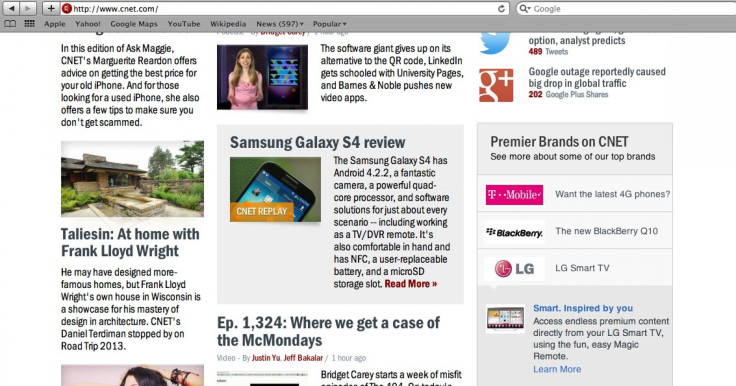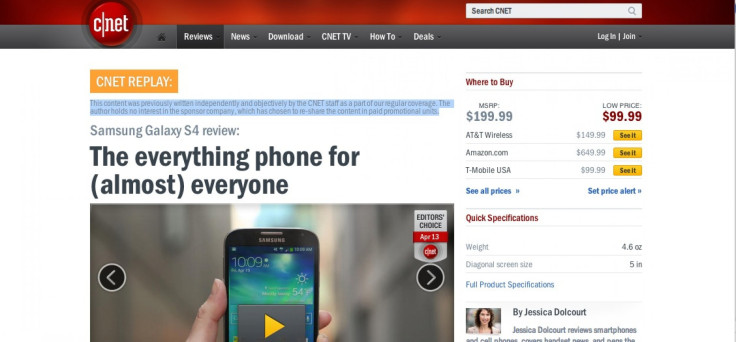CNET Replay Controversy: Are Samsung And Microsoft Paying For Best Placement Of Positive Reviews? (CORRECTED HEADLINE)
Native advertising has become a popular new tool for digital news organizations to monetize their content, but it has been met with great controversy from journalists that advocate for a clear separation between advertising and editorial. CNET, a popular tech news and reviews website owned by CBS Corp. (NYSE: CBS), is pushing the envelope a bit further with a new product that allows tech companies like Samsung and Microsoft (NASDAQ: MSFT) to pay to have a positive product review highlighted on the CNET homepage.
Digiday noticed that a CNET review of the Samsung Galaxy S4 that rated the device 4.5 out of five stars back in April was featured on CNET’s homepage earlier this week. Samsung paid CNET to promote the review as a part of “CNET Replay.” Intel Corp. (NASDAQ: INTC) and Lenovo have also paid to feature positive reviews with CNET Replay long after the review was actually written.

A yellow box indicates that the review is a part of CNET Replay, but does not say that these are purchased. The only notification readers get is a statement within the article that states, “This content was previously written independently and objectively by the CNET staff as a part of our regular coverage. The author holds no interest in the sponsor company, which has chosen to re-share the content in paid promotional units.” It does not indicate that Samsung paid for the promotion. Many readers will never realize that the link they opened was promoted by an advertiser.

CNET maintains that editorial content is made independent of advertising partners and that editorial staff is not paid to write positive reviews. Advertisers cannot change headlines, edit the reviews or alter user comments. Reviews featured in CNET Replay also don’t feature any other banner ads. Marketers say that CNET Replay is no different than the practice of selling ads that highlight positive reviews.
So tech companies aren’t paying editors to write positive reviews. But if an editor writes a positive review, they may get paid later. For many, the possible incentive removes any possibility of being objective. Others have criticized CNET for not clearly labeling CNET Replay articles as advertising.
CNET reviews are so popular that, according to Digiday, a website that covers digital media and marketing, paying to promote a positive review is worth more than purchasing a banner ad. CNET told Digiday that CNET Replay articles increase purchase intent by 500 percent. CNET plans to extend CNET Replay to its video game website, Gamespot, to allow video game developers to promote positive reviews.
In January, CNET lost its ability to select the official Best in Show awards at the Consumer Electronics Show after CBS forced the website to retract its nomination of the Dish Network Hopper. CBS was involved in a lawsuit at the time with Dish Network, which CBS eventually lost.
Should tech companies be allowed to pay CNET to feature positive reviews on the homepage? Should CNET Replay articles be labeled more clearly? Let us know in the comments.
© Copyright IBTimes 2024. All rights reserved.












